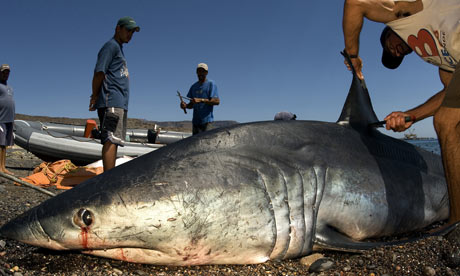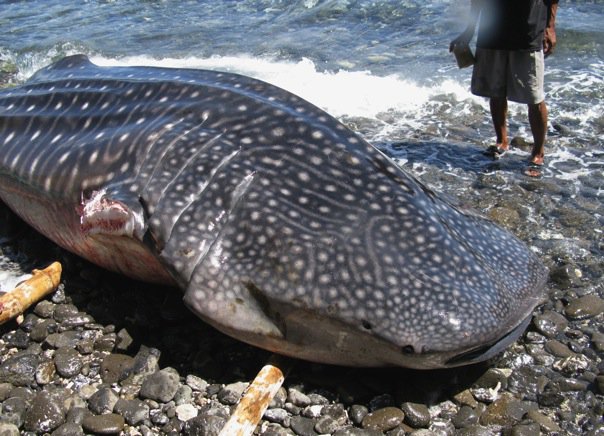Take a good look at the animal pictured above. This species of shark is known as the shortfin mako shark. The first thing many people will notice about this animal is it's teeth, it's size, or it's likeness to another, more famous species of shark, the great white. What most people will not know is that this image is actually a picture of the fastest shark in the world. In the open ocean, this shark can reach speeds of over 60mph and can leap over 15 feet into the air! Think about that for a second. Try to picture a fish leaping that far out of the water. It's a pretty big accomplishment, especially for an animal that can weigh over 1,000lbs. As intimidating as this animal may look, it rarely interacts negatively with humans. The majority of incidents where shortfin mako sharks have bitten a person occur after the animal has been hooked. Can't really blame the animal for defending itself can you? These animals typically do not come close to shore so in general, bathers and surfers don't have to even worry about these sharks while playing in the surf. For an animal that rarely encounters humans, outside of fisherman, you would think their populations would be plentiful. Well they are not.

Here's a more familiar face to many people. The great hammerhead shark. Once abundant in tropical and sub tropical seas, these animals continue to be found throughout different areas of the world. Being a worldwide species of shark one would think that their populations are high right? Not so much.

Here's probably the most familiar face when the word shark is used. Here is the (great) white shark. The star of many a shark movie, many people think that the oceans are teeming with these guys, but guess what. That's not the case.
See a trend forming? I could go on posting pictures of sharks and tell you that each and every one of them are in extreme danger. Out of the three I posted, two of them (white and mako) are currently listed as Vulnerable to extinction on the IUCN's Red List while the other (hammerhead) is listed as Endangered. Yes you read that right all three of these sharks, and many others, are seriously being threatened with extinction. The answer to the following question is known be many people, but not enough. Why are these animals threatened with extinction? How are animals that have been on this Earth since before the time of dinosaurs now suddenly vanishing? How are the essential kings of the sea being dethroned, and by what? The answer to those questions are both shocking and horrific. If you have no idea what I am talking about then I would like to take a second to advise you to take a deep breath before reading what you are about to read.
The answer to what is causing these animals to vanish is probably pretty usual, man. The answer of how is what is really just disturbing, unethical, greedy, and frankly heartbreaking. Shark finning is the process of catching a shark, cutting it's fins off, and then throwing the often times still living animal back into the water to die from blood loss, suffocation, or from being eaten. It is a horrific way to go and equates to a human's arms and legs being cut off and then the still living body being tossed into the sea. It is partially responsible for the estimated 100,000,000 shark deaths that occur worldwide on an annual basis. Shark finning is often the by product of another practice of fishing called long lining.



Long line fishing in an extremely dangerous style of fishing that threatens nearly all marine life as well as sea birds. Long line fishing kind of looks like this. .

So as you can see, there is a large number of baited hooks in which the target fish, usually tuna or swordfish, are supposed to bite. The lines are left in the water for over a day and can reach lengths of over 100 miles in length. The fisherman then return. The results are never exclusive to the target fish. Sharks, seals, turtles, birds, small whales, dolphins, and just about anything else that bites the hook is trapped. In the case of turtles, birds, and mammals, they will drown because the weighted lines will prevent them from surfacing to breathe. Sharks and other fish often get tangled in the lines causing them to drown. These reasons alone, I feel are justification enough to have this fishing style outlawed considering the sheer number of animals that are killed on accident by them every year, however it is only illegal off the west coast of the United States. Sharks that are caught on these lines are often finned alive or dead.
So why the fins? From the boats, the shark's fins are sent to Asia where they are dried and used in a soup known as shark fin soup. The soup itself is tasteless, but is flavored with either chicken or beef flavoring. The shark's fin adds a gelatinous texture to the soup as well as a dose of mercury (always healthy right?). Shark fin soup sells for an estimated $100 U.S.D. PER BOWL. Yes a hundred dollar bowl of soup. The soup apparently had it's start in China where it was given exclusively to the Emperor as a symbol of status. Times of course changed and now this symbol of status is widely used in not just China, but in other countries including the United States. The shark's fins sell for an incredible amount of money. For example, a whale shark fin has sold for over $50,000. Yes one fin. So once again it boils down to money. So what is the status of sharks?
Many shark species are in a heavy decline due to shark finning and long line fishing. Both practices have led to certain species seeing their populations decline by as much as 99%. Obviously not a good thing at all there. Around the world, more and more shark sanctuaries are starting to pop up and more countries, including China, are taking steps to driving down the demand for shark fin soup. For example, China has cracked down on the extravagance of government banquets which has banned shark fin soup from being included as it once was. Several states in the United States have banned the sale and trade of shark fins, but it appears that NOAA may try to undermine those laws. New Zealand has recently "banned" shark finning, but has allowed fisherman an extensive grace period that will allow the practice to continue for some time. In the mean time, sharks are still in rapid decline not only off of New Zealand, but around the world as the demand for shark fin soup remains high. So what could this do to the world?
Honestly, and I know it may sound crazy at first, but this could lead to the end of the natural world as we know it. Allow me to explain. Sharks are the apex predators of the sea, very similar to lions in their natural habitat or the way wolves used to be in areas of the U.S.. If you remove the apex predator as we are doing to sharks, the next level of the food chain will see their populations explode. Unlike all of the animals below them, sharks have a very slow reproductive cycle and do not mature until later in life. Many species only give birth to one pup every season. So with sharks removed the next level will take over and eliminate anything below it until there is no food for them and then they die off. In the seas what that will leave you with are things such as algae and that's it. The secondary predators will take care of all the shellfish and small fish and once they are gone there will be nothing left. It's a simple food chain equation. We've seen examples of this already in the United States, but people are still not getting it. One perfect example is the shellfish crisis going on in the Chesapeake Bay.

There has been a large decline in shark populations surrounding the bay and as a result in recent years the cownose ray (secondary predator) population has literally exploded.

As you can see in the image above, these animals eat shellfish which are filter feeders and algae eaters. As a result, the shellfish populations in the bay have seen serious declines to the point where the bay has needed to actually be restocked by people. The bay's water quality has also suffered as a result. It's just a small sample though of what would be to come should sharks go extinct. It's not the fault of the rays. They're just doing what is natural to them. It's all on the people who are eradicating the ray's natural predators.
Sadly, to my knowledge, only one documentary has really gone out and attacked the shark finning industry to date. That documentary is called Sharkwater. I highly suggest picking it up at some point and watching it, but coming soon there is a new documentary coming out that further exposes the disgusting shark finning industry called Extinction Soup.

According to Extinction Soup's Facebook page, the plot of the film looks like this
.
"Extinction Soup" follows documentary filmmaker Philip Waller on his quest for adventure as he sets out to tell the story of his larger-than-life friend and extreme sports legend, Jimmy Hall. The film quickly takes a surprise turn when Waller finds himself consumed with exposing to the world an environmental catastrophe in the making - the extinction of the oceans' shark population through the mass slaughter of these magnificent animals for their fins. Waller documents the efforts of conservationist Stefanie Brendl as she fights to educate lawmakers and help pass ground-breaking legislation that will curb the consumption of shark fin soup, considered a delicacy in many Eastern cultures, and the impetus behind 70 million sharks being killed per year."
The film has no slated release date, but it is hoped that it will land sometime in mid 2014. For more information on Extinction Soup visit their website at http://www.indiegogo.com/projects/extinction-soup. Still though, the issue of shark finning and long line fishing continues to be one that needs to be shown to the world. When this documentary is released it could go a long way to bringing attention to a massive issue going on in our seas in a similar fashion to how The Cove did for the dolphins or Taiji! To quote the great Captain Paul Watson, "If the Ocean's die, we die". I couldn't agree more with that statement and if the world does not act to save sharks we will be facing a dead ocean and eventually the end of life on land as a result as well.
As mentioned in my previous blog, here is a nice video of whale sharks swimming in the wild. There is a great deal of money to be made on shark tourism. Far more over a long period of time than can be made from their fins... Till next time!